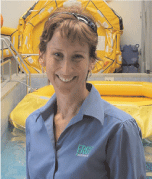Safe supervisor competency program (SSCP): a new approach to training and skills development—the behavioural revolution
Miranda Taylor A and Bronwyn Struthers BA APPEA.
B ERGT.
The APPEA Journal 53(2) 443-443 https://doi.org/10.1071/AJ12054
Published: 2013
Abstract
Although the safety performance of the Australian offshore oil and gas industry is best performing in Australia, evidence shows that it performs lower than the oil and gas industries in other parts of the world.
In addition, there has been a huge intake of new and inexperienced workers—often from other Australian industry sectors with worse safety performances—particularly in the high-risk offshore construction sector. This industry has also experienced unprecedented growth in recent times. These challenges, combined with a strong commitment from the industry’s CEOs to relentlessly pursue continual improvement, provided a compelling case for change.
Everyone, from the frontline to the boardroom, plays a critical role in improving safety performance. A range of CEO-safety leadership programs, including the Common Safety Training Program (CSTP) targeted at new entrants to the oil and gas industry, address safety performance.
Supervisors are major leaders in workplaces; they are often selected based on technical skills and experience, not always on their people and leadership skills. Before becoming supervisors, many do not receive any related training and/or development, particularly in the offshore construction sector where high turnover and constant change are typical. The solution was seen to be a standard approach to supervisor competence, commonly recognised by all industry players.
The Safe Supervisors Competence Program (SSCP) was launched in early March 2011. SSCP is a new industry initiative focused on safety leadership. The program provides supervisors with the skills and behaviours to ensure the safety of individuals and workplace teams and the ability to influence safe behaviours.
This extended abstract addresses the SSCP:
-
The problems that promoted its development.
-
How the industry views it as a key solution to those problems.
-
Its philosophy and approach to learning.
-
Its differences compared with other programs.
-
Visual testimonials and footage of its participants.
-
Its future and why it is now with APPEA.

Miranda Taylor is APPEA’s national director of environment, safety, and productivity; she has worked with APPEA for six years. She sits on a number of key industry policy committees and forums, including supporting the APPEA Montara task force, which is now established as a permanent well safety and integrity committee. Prior to joining APPEA, she spent more than 20 years in HSE management and labour relations in the oil and gas and resources sector; in addition, she has extensive experience in strategic policy and political advocacy, working with state and federal governments in Australia. She has an honours degree (international economics and politics) from the London School of Economics, London University, and a postgraduate degree (industrial relations). |

Bronwyn Struthers is an organisational development specialist presently working at ERGT in the role of people and product development. She graduated with an honours degree (psychology) in 2003. Since then, she has worked in a number of people-development roles supporting individuals, teams, and organisations to maximise performance. As an employee and as a consultant, she has experienced a number of sectors, including production, mining, government, prisons, and retail. Her understanding of high-risk environments has led to an interest in mental health and its impact on the workforce. |
References
APPEA, 2011—APPEA safety performance data report. Canberra, Australia: APPEA.APPEA, 2012—State of the industry 2012. Canberra, Australia: APPEA.
Deloitte, 2012—Advancing Australia supplementary analysis. Deloitte Access Economics, November. Sydney, Australia: Deloitte Australia.
International Association of Oil and Gas Producers (OGP), 2011—Safety performance indicators—2011 data. Report no. 2011S. London, UK: OGP.
Wood Mackenzie, 2012—Wood Mackenzie LNG tool. Accessed August 2012. http://www.woodmacresearch.com/cgi-bin/wmprod/portal/energy/productMicrositeRegister.jsp?productOID=2992632.


